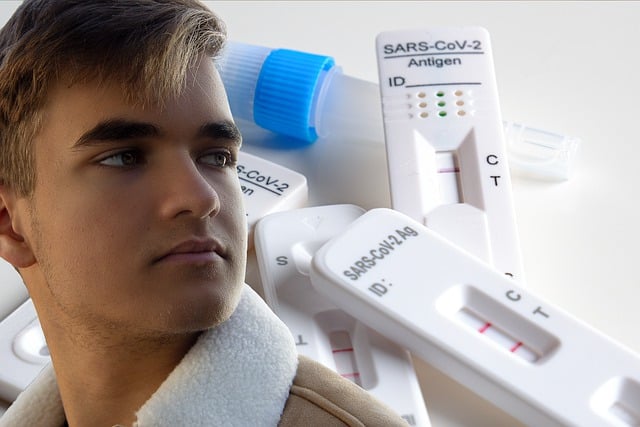Male reproductive health hinges on specific hormone levels, with testosterone crucial for sexual development and physical attributes. Hormones like luteinizing and follicle-stimulating hormones regulate testicular function and sperm production. The UK Diabetes Blood Test is a powerful diagnostic tool, assessing insulin, glucose, and other hormones to identify imbalances linked to conditions like type 2 diabetes, insulin resistance, and hypogonadism. Early detection allows healthcare professionals to address reproductive challenges effectively through tailored management plans, including hormonal replacement therapy or lifestyle changes.
“Unraveling the complexities of male reproductive health, this article delves into the crucial aspect of hormone analysis. Understanding male hormone levels is key to diagnosing various reproductive issues, often hidden beneath the surface. The UK Diabetes Blood Test emerges as a powerful tool in this process, offering insights into hormones like testosterone and others. By interpreting these results, healthcare professionals can guide patients towards tailored treatments. From identifying low T to managing conditions like polycystic ovary syndrome (PCOS), this analysis is a game-changer in reproductive medicine.”
- Understanding Male Hormone Levels and Their Role in Reproductive Health
- The UK Diabetes Blood Test: A Tool for Diagnosing Reproductive Issues
- Interpreting Results and Next Steps After a Male Hormone Analysis
Understanding Male Hormone Levels and Their Role in Reproductive Health
Male hormone levels play a pivotal role in reproductive health, with each hormone contributing to specific functions. Understanding this intricate balance is crucial when diagnosing reproductive issues in men. Testosterone, often associated with masculinity, is the primary driver of sexual development and maintains libido, muscle mass, and bone density—all essential for overall reproductive fitness. Other key hormones, such as luteinizing hormone (LH) and follicle-stimulating hormone (FSH), regulate testicular function and sperm production, ensuring optimal fertility.
In the UK, diabetes blood tests often include measurements of these male hormones to assess reproductive health, especially in individuals with insulin resistance or metabolic disorders. Imbalances can indicate underlying conditions like hypogonadism, where low testosterone levels impact sexual functioning and overall well-being. By analysing hormone levels, healthcare professionals can identify and address reproductive challenges early on, promoting better outcomes for men seeking treatment for fertility-related issues.
The UK Diabetes Blood Test: A Tool for Diagnosing Reproductive Issues
The UK Diabetes Blood Test is a valuable tool in diagnosing reproductive issues, offering insights into male hormone levels. This comprehensive test assesses various hormones, including insulin and glucose, providing a clear picture of metabolic health. For men experiencing fertility challenges or symptoms like abnormal vaginal discharge, heavy menstrual bleeding, or erectile dysfunction, this test can be instrumental.
By analyzing blood samples, healthcare professionals can identify imbalances in hormones crucial for reproductive function. The UK Diabetes Blood Test helps rule out or confirm conditions such as type 2 diabetes, insulin resistance, and hypogonadism, all of which may contribute to fertility problems. Early diagnosis through this test enables timely intervention, potentially enhancing reproductive outcomes and improving overall quality of life.
Interpreting Results and Next Steps After a Male Hormone Analysis
After undergoing a male hormone level analysis, interpreting the results is crucial for understanding the next steps. This process involves comparing the hormone levels against established reference ranges to determine if they are within normal limits or indicate potential issues. If the test reveals elevated or decreased hormone levels, it may suggest underlying reproductive problems such as hypogonadism, thyroid disorders, or even conditions like diabetes in the UK. In such cases, further medical assessments and specialized blood tests, including a UK Diabetes Blood Test, might be recommended to confirm diagnoses and guide appropriate treatments.
The next steps could include consulting with an endocrinologist or reproductive specialist who will consider factors like age, medical history, and lifestyle to tailor a management plan. This may involve hormonal replacement therapy, lifestyle modifications, or specialized interventions designed to balance hormone levels and address the identified reproductive issues effectively.
Male hormone level analysis, often facilitated by the UK Diabetes Blood Test, plays a pivotal role in diagnosing reproductive issues. By understanding hormone levels and their impact on fertility, this simple test can be a game-changer for men seeking to unravel reproductive challenges. Interpreting results accurately is key, guiding next steps towards effective treatment or management strategies. This approach ensures that individuals can navigate the path to improved reproductive health with confidence and clarity.
